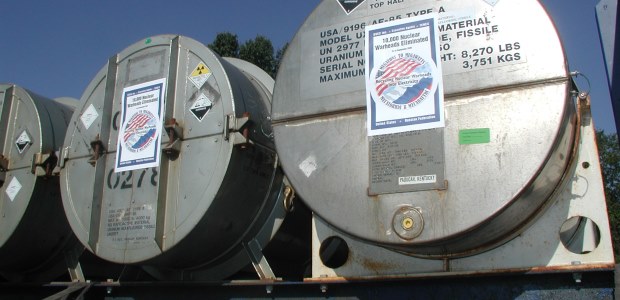
Final Shipment Completes Megatons to Megawatts Program
"Today the United States and Russia are commemorating the completion of one of the most successful non-proliferation programs in our history," National Security Council spokesperson Caitlin Hayden said.
USEC Inc. and the White House announced that the last cylinders of low enriched uranium under the Megatons to Megawatts™ program were shipped Dec. 10 from the Port of Baltimore to its facility in Paducah, Ky., completing a two-decade, $8 billion program under which the company purchased more than 14,000 metric tons of low enriched uranium downblended from 500 metric tons of weapons-grade uranium that was extracted from the equivalent of 20,000 Russian nuclear warheads. Nearly 10 percent of all electricity generated in the United States since 1990 came from this material as it was used to fuel U.S. nuclear power reactors. It was sufficient to power the United States for nearly two years.
"Together, USEC and Techsnabexport, working in close partnership with our respective governments in the United States and Russia, have fueled the production of clean, reliable electricity through an historic nonproliferation program that USEC funded at no cost to taxpayers," said John Welch, USEC’s president and CEO. "Over the past two decades, our commercial business operations have greatly advanced the strategic policy goals of our national governments, benefitting all mankind with a safer, cleaner world."
"Today the United States and Russia are commemorating the completion of one of the most successful non-proliferation programs in our history," U.S. National Security Council spokesperson Caitlin Hayden said in a statement posted on the White House website. "The United States and Russia remain strongly committed to building on this success, and will continue to collaborate across various fields of nonproliferation, nuclear security, and nuclear research and development," she added.
USEC is the executive agent for the U.S. government for this program, buying the downblended uranium and adding it to its fuel inventory for sale to its utility customers. "Our program's success resulted from strong bilateral cooperation and dedication to the effective execution of the contract over the long term," Welch said. "Our companies have worked together to implement the contract on terms that benefit both countries while providing America's nuclear reactors with competitively priced nuclear fuel. To that end, USEC's long-term contracts with American utilities supported the contract and provided stability to the program."
The program has safely completed more than 250 shipments of fuel between Russia and the United States, according to USEC.